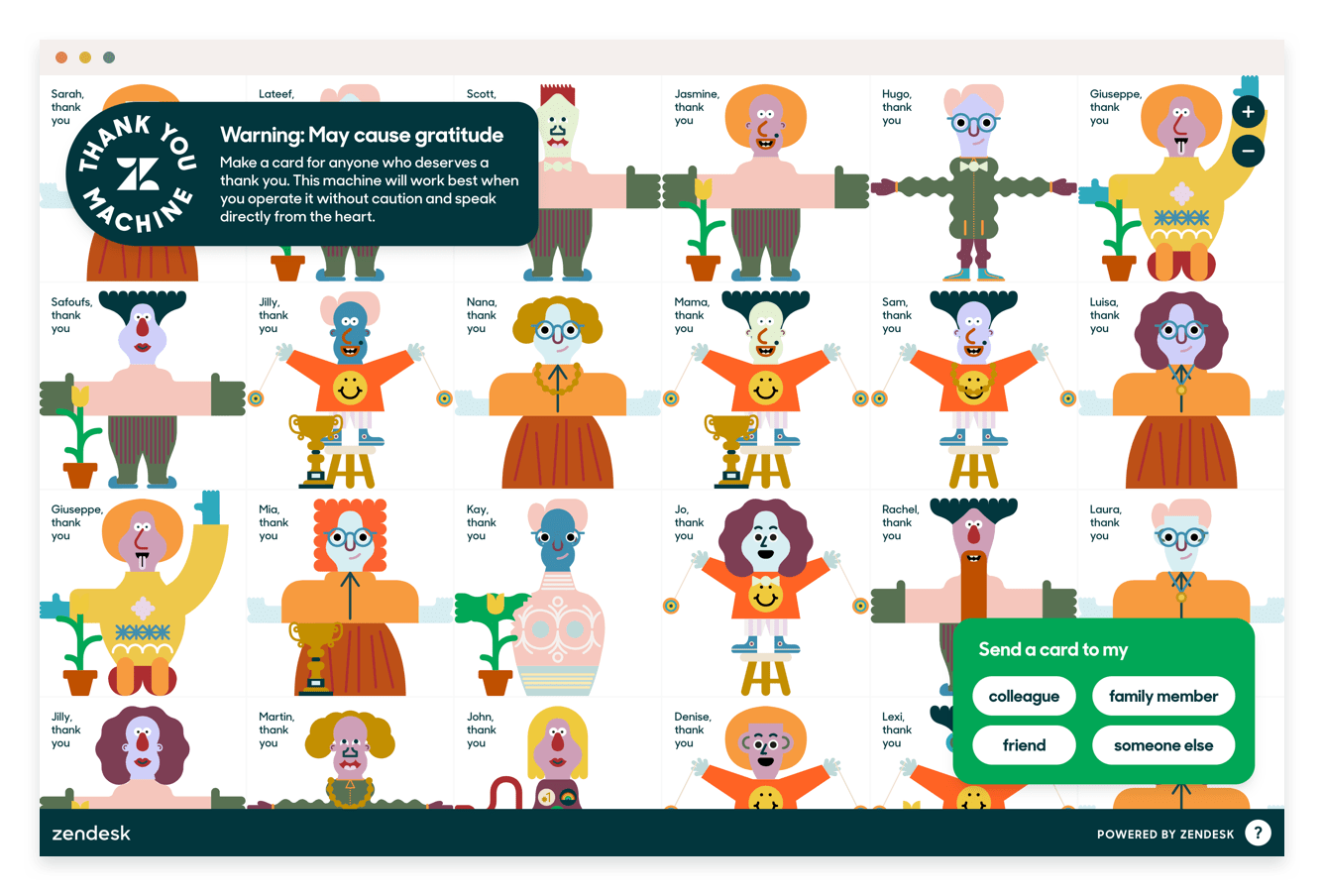Article • 4 min read
Empathy in a chaotic world — and a new way to say thanks
As we continue to ask ourselves, “How can we most be helpful to others, right now?” we think the answer lies within certain values essential to our company like appreciation and gratitude.
출처 Smita Pillai , Vice President, Global Head of Diversity, Equity and Inclusion
최종 업데이트: August 21, 2020
At Zendesk, our purpose as a business is to help businesses help billions of customers by solving problems, reducing complexity, and improving relationships. Right now, businesses are either suffering or surging. With ticket volumes spiking, support managers and agents are working hard to keep up.
It’s with that sense of appreciation and gratitude—which are core to our company’s values—that we continue to ask ourselves, “How can we most be helpful to others, right now?” Our Thank You Machine is a way to support the industry through empathy. We’re hoping to spread a little gratitude across the globe, and we’re aiming to do it in a way that’s both close to home and that hopefully will bloom exponentially.
Our Thank You Machine is not a response to world events, to the literal and metaphorical climate. But we believe every one of us could use a little goodness right now. And so we made something that can serve as a small gesture to brighten each other’s worlds and to build a community that reminds us we are all human.

Make a card to thank the colleague who sends you owl videos or the 6-year-old who taught you to use Tik Tok
Why we are thankful
At Zendesk, when we think about empathy and gratitude, our thoughts go immediately to a key set of organizations, to which we have recently donated over a million dollars. We’d like to take a moment to tell you about them and encourage you to thank them too, with whatever ongoing support you can offer.
Our goal is to encourage that exponential expression of gratitude—a million thank yous, if you will—to reflect the spirit of these recent donations and to draw additional attention to these organizations’ good works.
- Color of Change – Think of it as an online Black power machine. Color of Change operates digital campaigns for racial and economic justice, works to #TellBlackStories, and makes it simple for people to launch their own projects, prominently displaying a video and tools on how to run an effective digital campaign. Watch this excellent recap of its 2019 efforts.ENAR Foundation – There are 10 to 12 million Roma people in Europe, and 78 percent of those in Slovakia alone face discrimination when seeking employment. The European Network Against Racism combats antigypsism, afrophobia, and all the sinister tendrils of racism that are specific to European countries. This Q&A with activists on its blog explores the concepts of human rights, mental health in activism, and how volunteers can stay safe in work that can be very dangerous.
- Black Girls Code – Train a million girls by 2040! That’s just one of BGC’s goals. Founded in 2011, this group addresses the digital divide through workshops, hackathons for girls between the ages of 12 and 17, and cool after-school programs.
- Southern Poverty Law Center – The SPLC has been at the forefront of documenting the rise of white nationalism in the U.S., testifying before Congress about white supremacy in the military in February. Since 1990, SPLC has done an annual census of U.S. hate groups; its Hate Map is a chilling visual barometer.
- The Codette Project – Seeking to boost opportunities for Muslim and minority women in tech, Codette’s projects include workshops and women-only hackathons.
- NAACP – Did you know Rosa Parks was a member of the National Association for the Advancement of Colored People? As was field director Medgar Evers, assassinated a few hours after JFK’s Civil Rights Address. For decades this group has tirelessly fought for election reform, housing rights, and the eradication of race-based discrimination.
- International Rescue Committee – The pandemic has added a grim new strain to refugee crises across the globe. The IRC helps the world’s more than 70 million displaced people in addressing immediate needs, rebuilding lives, and envisioning new solutions with governments in cases of long-term displacement.
- The Asia Foundation – We love the Emerging Issues Lab, which helps this organization stay abreast of constantly changing geopolitical, environmental, and legal/regulatory dynamics in the 18 countries in Asia where it works on improving lives. Expanding digital literacy and helping workers adapt to shifting labor markets are two areas of focus.
- National Urban League – Focused on every area of civil rights since 1910, the National Urban League serves 300 communities in 37 states. Its new HQ in Harlem will feature a Civil Rights Museum that we hope to one day visit.
- Hack Your Future – A free, seven-month Web development program for refugees and other disadvantaged groups. Thrilling work. This coding school partners with some of the biggest names in tech — more than 85 percent of its 150 graduates to date have found a job.
